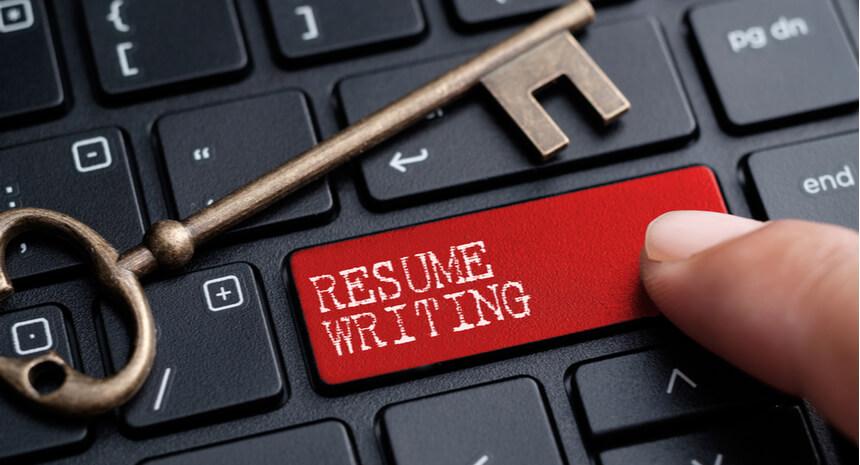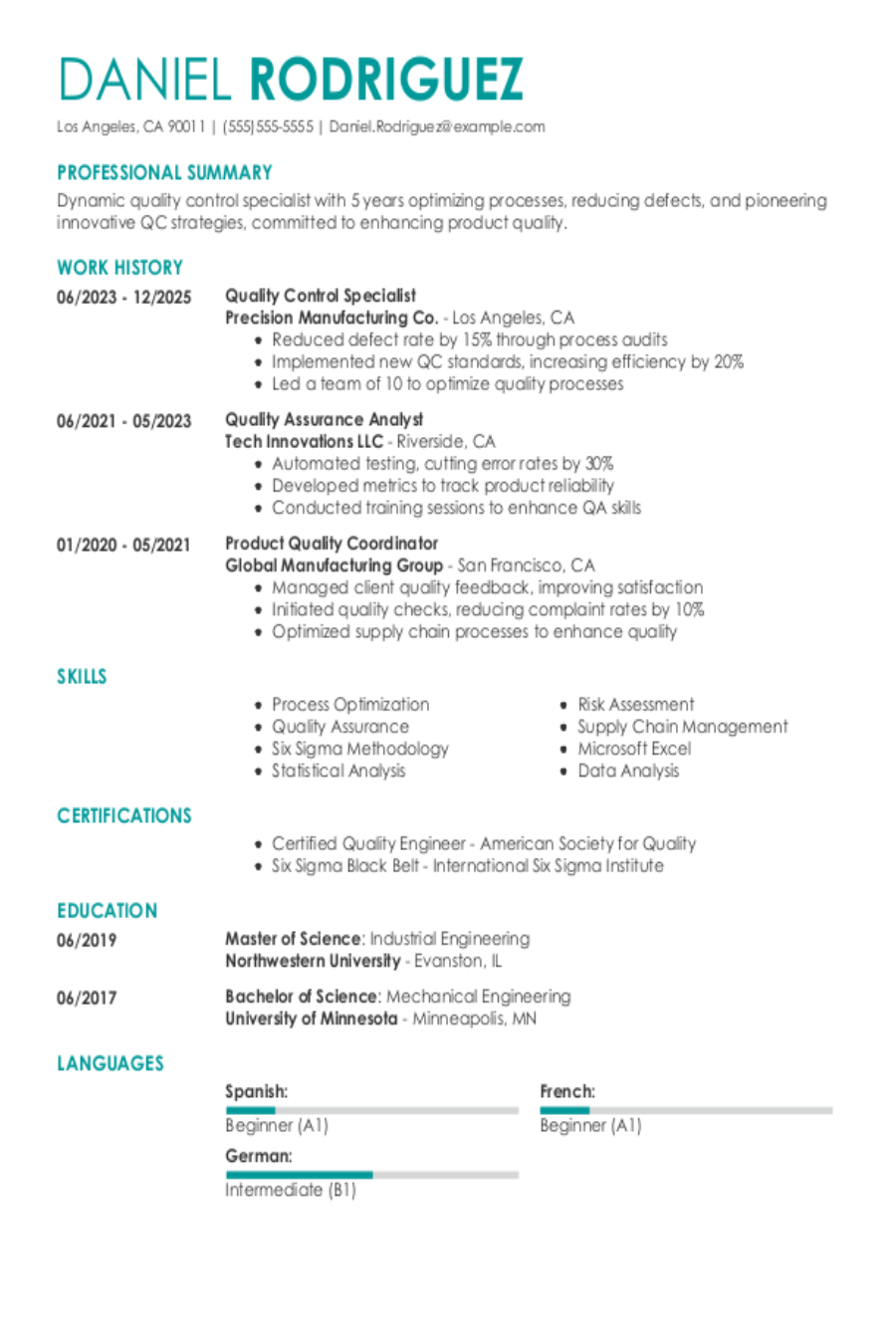Table of contents
- The 25 Most Common Job Interview Questions & Answers
- 8 of the Top Behavioral Interview Questions & Answers
- 5 of the Top Self-Assessment Interview Questions & Answers
- 6 of the Top Role-Fit Interview Questions & Answers
- 6 Common General Interview Questions & Answers
- Tips for Answering Job Interview Questions
- Key Takeaways
Interviews are easier when you know what to expect. Practice your answers to 25 of the most common job interview questions in 2026 using our sample answers as a guide to help you stand out to employers.
Our guide will cover:
- 25 of the most popular job interview questions and answers that will help you stand out
- How to answer 8 of the top behavioral interview questions
- How to answer 5 of the top self-assessment interview questions
- How to answer 6 of the top role-fit interview questions
- How to answer 6 of the top general interview questions
- Tips for answering job interview questions
Need a strong resume to land the interview? Try our AI Resume Builder for professional writing tips, tailored resume content, and step-by-step help building and customizing each section.
The 25 Most Common Job Interview Questions & Answers
Learning how to answer interview questions isn't an exact science. There's no "right answer" to any interview, but the more thought you've put into the role and your career, the better equipped you'll be to tackle them.
To help you prepare for the job interview, we'll look at the most common interview questions broken down into the following categories:
- Behavioral
- Self-assessment
- Role-fit
- General interview questions
8 of the Top Behavioral Interview Questions & Answers
Behavioral interview questions are designed to show how you handle real-world situations at work. This section covers eight of the most common behavioral questions, with answers that highlight problem-solving, leadership, and teamwork skills.
#1
Can You Describe a Challenging Situation at Work & How You Handled It?
This is a common behavioral interview question. Every role has hard days, so it's no wonder that interviewers want to hear about your strategies for handling them.
Try to keep this conversation focused on the solution rather than the problem. To do this well, we recommend using the STAR method: Situation, Task, Action, and Result. Using the STAR method to answer interview questions encourages you to guide the interviewer through your thought processes and methodologies for tackling challenges.
Tell the story of your workplace challenge in your answer while emphasizing your active role in problem-solving.
Sample answer: "At my previous organization, we faced a labor shortage that eventually led to reduced store hours. This damaged our sales numbers, so I was tasked with organizing a recruitment campaign. I placed ads in the local papers and set up a booth at a nearby college employment fair. The ads got some responses, but the booth was a big success that attracted a lot of candidates. Within three months, we had hired and trained five new associates, and our store was able to return to normal operation hours."
Sample answer: "During a delayed project, I reorganized tasks, reassigned priorities, and coordinated closely with the team. We recovered lost time and delivered the project successfully, keeping the client satisfied."
#2
Can You Tell Me About a Time You Demonstrated Leadership Skills?
Employers want to see examples of how you've led or inspired others. Share a specific situation, describe your leadership approach, and highlight the positive results you achieved.
Sample answer: "In my previous role, I led a team during a system migration. I organized weekly progress meetings, assigned tasks, and provided support to team members. As a result, we completed the migration two weeks early and saved 15% of the projected budget."
Sample answer: "In my last role, I took the lead on a new client onboarding process. I delegated tasks based on team strengths, set clear deadlines, and held brief daily check-ins. The team successfully onboarded five clients ahead of schedule, improving client satisfaction and boosting our department's efficiency."
#3
How Do You Handle Feedback or Constructive Criticism?
Employers value candidates who can learn and grow from feedback. Highlight your openness and share an example of how you used feedback to improve.
Sample answer: "I value constructive feedback as an opportunity to grow. For example, a manager once suggested I improve my presentation skills. I enrolled in a public speaking workshop, and my confidence and delivery significantly improved."
#4
How Do You Prioritize Your Tasks When Managing Multiple Deadlines?
Time management and organizational skills are crucial for most roles. Show how you assess urgency and importance, delegate when needed, and stay on track under pressure.
Sample answer: "I start by listing tasks and deadlines, then prioritize based on urgency and impact. For example, during a product launch, I focused on high-impact deliverables first and delegated smaller tasks, ensuring all deadlines were met without sacrificing quality."
#5
How Do You Handle Working With a Difficult Coworker or Client?
Employers want to know you can resolve conflicts professionally. Share an example where you successfully navigated a challenging relationship through communication and understanding.
Sample answer: "I focus on understanding their perspective and finding common ground. For example, I worked with a demanding client by scheduling regular check-ins to proactively address concerns, improving our relationship and project outcomes."
#6
How Do You Handle Pressure & Tight Deadlines?
Despite how often people say this in interviews, most people don't "thrive under pressure." This interview question aims to understand how you handle demanding work assignments and your time management skills.
Even if you find tight deadlines upsetting, you shouldn't answer this question by explaining all the ways that too much pressure makes you sick. Instead, give a calm rundown of the coping methods you use to deliver work under less-than-ideal conditions.
Sample answer: "Tight deadlines can be tough, but I find that breaking down big tasks into smaller, more manageable chunks is a great way to get started. I like to follow a rule where any task that can be done in less than 30 minutes comes first. This helps me stay on top of the small things so that I can devote my energy to bigger problems when that time crunch starts to close in."
#7
Can You Give an Example of a Time When You Went Above & Beyond for a Project?
This question aims to gauge your willingness to exceed expectations. Share a specific situation where your extra effort had a meaningful impact.
Sample answer: "During a critical product launch, I volunteered to handle additional marketing tasks when a team member fell ill. I worked late to meet deadlines, ensuring the launch was seamless and exceeded sales projections."
Sample answer: "While preparing a quarterly report, I noticed missing data that could affect key insights. I stayed late to gather and verify the information, updated the report, and presented it on time. My attention to detail helped leadership make informed decisions and prevented potential errors."
#8
What Steps Do You Take to Ensure High-Quality Work?
This question explores your attention to detail and commitment to excellence. Share the processes you follow to deliver consistent, error-free results.
Sample answer: "I double-check my work for accuracy and follow established workflows. For instance, I created a checklist system in my previous role to ensure all reports were thoroughly reviewed before submission, resulting in a 30% decrease in errors."
5 of the Top Self-Assessment Interview Questions & Answers
Self-assessment questions help employers understand your strengths, weaknesses, and how you view your own skills. This section covers key questions that let you showcase your abilities, growth mindset, and fit for the role.
#1
Tell Me About Yourself
The best answer to this common open-ended interview question focuses on who you are as a professional. Think about your career and the skills you use every day.
Avoid going into too much detail on any one point; instead, provide a brief, conversational overview of your professional journey. The point here isn't to summarize your entire professional history, but to give the interviewer a sense of the most relevant ways your experience matches their needs.
Sample answer: "I'm a civil engineer with nine years of experience in commercial construction projects. I have a strong background in architecture, and my previous role at Vista Property Development provided me with lots of opportunities to manage sites and oversee design teams. Outside of work, I enjoy the outdoors and am an avid hiker."
Sample answer: "I'm a marketing specialist with six years of experience in digital campaigns and brand strategy. In my last role, I managed a team of three and led projects that increased engagement by 25%. I enjoy photography and exploring new social media trends to stay creative and inspired."
#2
What Are Your Strengths?
For this interview question, look at the job listing. Pay close attention to how the listing describes the ideal candidate. If the listing repeatedly mentions that they're searching for a candidate with strong organizational skills and attention to detail, make sure you include these in your answer.
Sample answer: "As a graphic designer, I think my creativity is one of my greatest strengths. It's what allows me to adapt to changes on the fly and fine-tune my ideas to align with my client's vision."
#3
What Are Your Weaknesses?
Nobody wants to put themselves down in front of someone they're trying to impress. The key is to be honest while still highlighting the ways you are working to overcome your weaknesses.
Recognizing your weaknesses and identifying ways to address them is a strength in and of itself. You don't want to panic and give a hasty answer to this question, so we recommend coming to the interview prepared with some weaknesses to discuss.
If you do draw a blank when asked about your weaknesses, don't rush it! Take a breath and give the best answer you can, even if you need to think for a moment.
Sample answer: "I sometimes struggle with asking for help when I need it. I like to think of myself as an independent worker, but moving forward without proper guidance or context sometimes leads to mistakes. I am working on improving this by establishing open communication about my thought process and the areas in which I feel uncertain."
Sample answer: "I can be overly detail-oriented, which sometimes slows me down on larger projects. I've been working on balancing thoroughness with efficiency by setting clear deadlines for each task and checking in with teammates to stay on track."
#4
What Motivates You to Perform Well at Work?
Employers ask this to understand your internal drive and what keeps you focused. Share specific motivators, such as personal growth, teamwork, or achieving measurable goals. Connect your answer to the role you're applying for to show alignment with the company's culture.
Sample answer: "I'm motivated by opportunities to solve challenging problems and contribute to meaningful outcomes. For instance, in my previous role, I streamlined our reporting process, reducing delays by 20%. Knowing my work made a difference energized me to keep improving."
#5
What Do You Consider Your Greatest Professional Achievement?
Highlight an accomplishment that demonstrates your value and aligns with the company's goals. Use specific metrics or results to quantify your success.
Sample answer: "My greatest achievement was leading a customer loyalty program that increased retention by 15%. I conducted market research, designed the program, and collaborated with cross-functional teams to execute it successfully."
6 of the Top Role-Fit Interview Questions & Answers
Role-fit questions help employers see how well your skills, goals, and working style align with the company and position. This section covers key questions that give you the opportunity to show your fit and enthusiasm for the role.
#1
Why Do You Want to Work for Our Company?
There are many reasons why you might be considering this particular role. Whether or not you have a genuine interest in the organization itself, you should come prepared to discuss this question. Research the company and the role to identify the things that excite you most about it.
Often, interview questions are designed to give you space to talk about yourself. This question allows you to provide an interview answer that outlines how your career values align with the company's values.
Sample answer: "I'm really passionate about personal finance and financial literacy, so when I heard about Generation Bank's community education programs, I was intrigued. When I looked deeper into the role, I found that a lot of the responsibilities align with the strengths that I've been recognized for in previous roles."
Sample answer: "I admire TechNova's focus on sustainable innovation, and I'm excited about the chance to contribute to projects that have a real environmental impact. The role aligns perfectly with my experience in project management and my passion for creating solutions that make a difference."
#2
What's Your Preferred Working Style?
With this question, an employer may be trying to determine whether you're a good cultural fit for the role. Try to be honest with your answer, even if you aren't certain it's what they want to hear.
A working style mismatch can be difficult to overcome once you've settled into your new job. Remember that your interview answers should help the interviewer decide whether you'll fit well into the role.
Sample answer: "I would describe my working style as collaborative. I perform best when I'm able to exchange ideas with coworkers. I truly enjoy the camaraderie of tackling complex issues with a team."
#3
What Are Your Salary Expectations?
This helps employers determine if your expectations align with their budget. Research the market rate for similar roles in your industry and location, and provide a range that shows flexibility.
Sample answer: "Based on my research and the responsibilities of this role, I'd expect a salary in the range of $60,000 to $70,000. I'm open to discussing this further and am excited about the opportunity."
#4
What Is Your Preferred Management Style?
This question assesses your compatibility with the company's leadership and culture. Be honest about your style while emphasizing flexibility to adapt to different team dynamics.
Sample answer: "I prefer a collaborative management style that encourages open communication. For example, in my last role, I held regular check-ins to align on goals and provide support, which boosted productivity and team morale."
#5
What Do You Hope to Accomplish in Your First 90 Days Here?
This shows your proactive approach and readiness to contribute. Mention how you plan to learn, integrate into the team, and make a positive impact.
Sample answer: "In the first 90 days, I aim to learn the company's processes, build strong relationships with the team, and contribute to ongoing projects. For instance, I'd focus on streamlining workflows to improve efficiency and deliver results."
Sample answer: "In my first 90 days, I plan to understand the team's current projects, identify areas where I can add value, and build strong collaborative relationships. My goal is to contribute quickly by improving existing processes and helping the team meet its early objectives."
#6
What Relevant Tools or Software Are You Most Proficient In?
Highlight technical skills that match the job requirements. Mention tools or platforms you've successfully used in previous roles.
Sample answer: "I'm proficient in Microsoft Office Suite, Google Analytics, and project management tools like Asana and Trello. In my last role, I also used Salesforce to streamline customer tracking and boost sales efficiency."
Sample answer: "I'm highly skilled with Adobe Creative Suite, Figma, and Monday.com for project management. In my previous role, I used these tools to design marketing campaigns and track team progress, which improved project turnaround times by 20%."
6 Common General Interview Questions & Answers
General interview questions help employers learn more about your background, motivations, and work habits. These common interview questions give you a chance to expand on your background, goals, and most critical skills.
#1
Can You Walk Me Through Your Resume?
This is your chance to guide the interviewer through your professional journey. Highlight the most relevant aspects of your career, focusing on achievements and skills that align with the job. Keep your explanation concise but impactful.
Sample answer: "I started my career as a marketing coordinator, where I learned campaign planning and analytics. Over the years, I took on roles with increasing responsibility, including leading teams and managing large-scale campaigns. I'm excited to bring this experience to your team."
#2
Why Are You Leaving Your Current Job (Or Why Did You Leave Your Last Job)?
This question helps employers understand your motivations for change. Avoid speaking negatively about your previous employer. Instead, frame your answer around seeking growth, new challenges, or better alignment with your goals.
Sample answer: "I'm looking for a role that offers more opportunities to grow my project management skills. While I value my current experience, I'm ready to take on new challenges that align with my long-term career goals."
Sample answer: "I'm seeking a role where I can take on more responsibility and continue developing my leadership skills. My previous position was a great learning experience, but I'm ready for new challenges that align more closely with my career goals."
#3
Why Should We Hire You?
When a company asks you this interview question, they're really giving you a chance to say anything that you think will help you land the role. It's another great opportunity to discuss any accomplishments or qualifications that haven't come up yet.
If you're really passionate about some aspect of the company or the role, your answer to this common interview question is a great place to describe that passion. If you've been acknowledged with awards or honors in the past and haven't found a good opening to discuss them yet, this is your chance!
Sample answer: "You should hire me because I am a passionate and dedicated teacher with a deep love for early childhood education. I am certain that my interest in supportive education will contribute to a stronger community here at Kennedy Elementary School. At my current school, I have been recognized as "Teacher of the Year" twice, thanks to an annual student body vote. I can achieve equal or better results as a teacher here."
#4
Where Do You See Yourself in 5 Years?
When formulating your answers, try to keep the purpose of the job interview questions in mind. This question is intended to help the interviewer learn about your ambitions and career trajectory.
It's okay to touch on your personal life, but "rocking a really cool hairdo in a brand new Corvette" is probably not the answer the hiring department is looking for. Instead, focus on your career goals and professional development.
Sample answer: "In five years, I see myself in a more senior role. My professional growth is really important to me, so I'd like to learn from my colleagues and hone my leadership skills so that I may eventually enter into a management position."
#5
How Do You Stay Updated on Industry Trends & Developments?
Employers want to know you're proactive about staying current in your field. Mention specific resources, like industry publications, webinars, or professional groups, that you use to keep your knowledge sharp.
Sample answer: "I stay updated by subscribing to industry newsletters, attending webinars, and participating in professional networks like [specific group]. For example, I recently attended a workshop on emerging digital marketing trends that helped me implement new strategies in my role."
#6
Bonus Question: Do You Have Any Questions for Us?
You've probably heard the advice before that you should always come into a job interview with a few questions of your own. This is a good idea, not just because it makes you look prepared, but also because it will help you better understand the role and the organization.
Building a list of interview questions to ask will give you and the interviewer new insights. Even though you're the one being interviewed, this process gives you the opportunity to "interview" the role and decide if you're sure it's the right place for you.
Sample answer: "Yes, I've prepared a few questions regarding the organization and the responsibilities of this role."
If you can't think of anything to ask, here are a few to consider:
- Can you describe the day-to-day responsibilities of this role?
- What does success look like in this role, and how is it measured?
- What professional development and growth opportunities does the company offer?
- What are the main challenges that this organization/department/team is currently facing?
- What is the company culture like here?
Tips for Answering Job Interview Questions
Answering job interview questions effectively is a skill that can make a lasting impression on potential employers. To help you shine in your next interview, follow these seven simple steps:
1. Understand the Question
Listen carefully to what the interviewer is asking. If the question seems unclear, don't hesitate to ask for clarification. Showing that you want to fully understand the question demonstrates attentiveness and professionalism.
2. Take a Moment to Think
Don't feel pressured to answer immediately. Take a brief moment to organize your thoughts. This ensures that your response is clear, structured, and directly addresses the question.
3. Use the STAR Method
For questions about your past experiences, such as "Can you tell me about a time you solved a problem at work?", use the STAR method. Structure your answer by explaining the Situation, your Task, the Action you took, and the Result of your efforts. This approach provides a clear and concise story that highlights your skills and achievements.
4. Keep It Relevant
Tailor your answers to the job you're applying for. Focus on examples and skills that align with the company's needs. For instance, if the job requires strong leadership, share a story that demonstrates your ability to lead and motivate others.
5. Be Authentic & Enthusiastic
Employers want to hire people who are excited about the opportunity. Speak genuinely and enthusiastically about how your skills and experiences make you a great fit for the role. Avoid overly rehearsed answers that sound robotic.
6. Connect Your Answer to the Company's Goals
End your response by linking your skills or experiences back to how you can contribute to the company's success. For example, if you're applying for a marketing role, emphasize how your expertise in data-driven campaigns can help the company reach its audience more effectively.
7. Be Concise
Your answers should be detailed and thorough, but not exhaustive. Keep it short, remember your interview practice, and make sure your answers are direct.
By following these steps, you'll be able to craft thoughtful and impactful answers that showcase your qualifications, professionalism, and enthusiasm for the job. Practicing these techniques ahead of time will help you feel confident and prepared when it's time to impress during the interview.
Key Takeaways
Be honest.
The interview is meant to help both you and the interviewer determine whether the role is a good fit. Claiming to be an expert at something you don't know how to do is only going to lead you to a big headache once you've accepted the role.
Give straightforward answers.
Generally, hiring departments want to know that you're able to assess yourself honestly and provide straightforward, thoughtful answers to their questions. Your interview question answers shouldn't beat around the bush too much.
Do your research.
Somewhere in the interview process, you will likely be asked about your thoughts on the organization or the role. Do your homework and come prepared to answer these questions.
Prepare some answers.
If you're the type of person who struggles with answering on the spot, it's a good idea to rehearse some answers to common questions to feel confident when answering the common questions that you can predict.
Act naturally.
Rehearsing a bit is a great way to come prepared to your interview, but make sure you still maintain an appropriately conversational tone. Be prepared to improvise and try to let the conversation flow naturally.
Ask questions of your own.
Come prepared with a few simple questions to ask before the interview. Try to keep in mind that learning about the organization is just as important—if not more so—than giving impressive answers to interview questions.
Was this information helpful? Let us know!
Hailey is a career advice writer dedicated to helping job seekers excel in their careers.
More resources

How to Write a Resume: Guide & Examples for 2026
If you re wondering how to write a resume that grabs attenti...

Summary of Qualifications: 13 Examples for Your Resume
Our guide will help you write a summary of qualifications that...

Plumbing Resume: Examples & Templates
As a plumbing professional you need a resume that captures th...

Purchasing Resume: Examples & Templates
As a purchasing professional you need a resume that captures ...

Quality Control Resume: Examples & Templates
As a quality control professional you need a resume that high...

